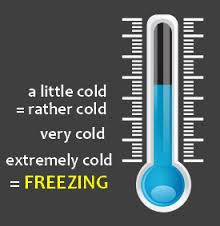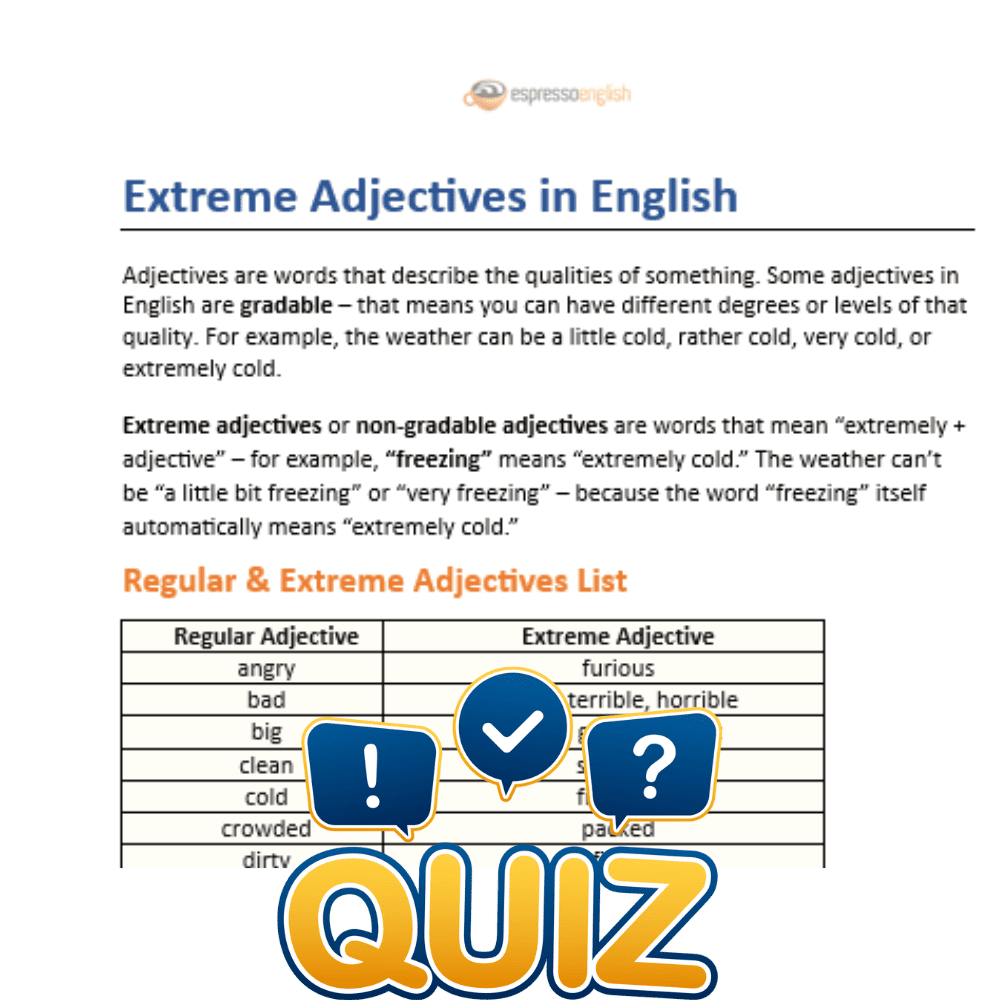
Download free lesson PDF + Quiz
What are Extreme Adjectives?

Adjectives are words that describe the qualities of something. Some adjectives in English are gradable – that means you can have different degrees or levels of that quality. For example, the weather can be a little cold, rather cold, very cold, or extremely cold.
Extreme adjectives or non-gradable adjectives are words that mean “extremely + adjective” – for example, “freezing” means “extremely cold.” The weather can’t be “a little bit freezing” or “very freezing” – because the word “freezing” itself automatically means “extremely cold.”
Regular & Extreme Adjectives List
| Regular Adjective | Extreme Adjective |
| angry | furious |
| bad | awful, terrible, horrible |
| big | huge, gigantic, giant |
| clean | spotless |
| cold | freezing |
| crowded | packed |
| dirty | filthy |
| funny | hilarious |
| good | wonderful, fantastic, excellent |
| hot | boiling |
| hungry | starving |
| interesting | fascinating |
| old | ancient |
| pretty | gorgeous |
| scary | terrifying |
| small | tiny |
| surprising | astounding |
| tired | exhausted |
| ugly | hideous |
Special Rules for Extreme Adjectives
1) No comparatives/superlatives.
With regular adjectives, we can use comparatives and superlatives to compare two or more things:
- My house is big.
- My neighbor’s house is bigger than mine.
(comparative) - My parents’ house is the biggest house on the street.
(superlative)
With extreme adjectives, we don’t use comparatives and superlatives:
- My parents’ house is enormous.
- My parents’ house is more enormous / the most enormous.
2) Use different adverbs with extreme adjectives.
With regular adjectives, we can use these adverbs:
- a little, a bit, slightly, fairly, rather
- very, extremely, immensely, intensely, hugely
Examples:
- I’m rather hungry. / I’m very hungry.
- This room is a bit dirty. / This room is extremely dirty.
- We’re a little tired. / We’re immensely tired.
With extreme adjectives, we CANNOT use these adverbs:
- I’m rather starving. / I’m extremely starving.
However, there are other adverbs we can use to give additional emphasis to the extreme adjective:
- absolutely
- completely
- utterly
Examples:
- I’m absolutely furious.
- We’re completely exhausted.
- The movie was utterly terrifying.
The words pretty and really can be used with both regular and extreme adjectives:
- This room is pretty dirty. (regular)
- This room is pretty filthy. (extreme)
- The party is really crowded. (regular)
- The party is really packed. (extreme)
Absolute Adjectives
Another type of extreme adjective is called an “absolute” adjective.
These are words that are either “yes or no.” For example, dead – you can’t be “a little bit dead” or “very dead” – either YES, you are dead, or NO, you’re not dead.
Here’s a list of absolute adjectives and their opposites (this list is not complete; it only shows some examples):
| Absolute Adjective | Opposite |
| complete | incomplete |
| equal | unequal |
| essential | non-essential; extraneous |
| dead | alive |
| fatal | not fatal |
| first | last / final |
| full | empty |
| ideal | not ideal |
| impossible | possible |
| infinite | finite |
| married | single / divorced / separated / widowed |
| perfect | imperfect |
| pregnant | not pregnant |
| unique | not unique |
| universal | not universal |
| unknown | known |
| true | false |
Note:
You might hear expressions like these in spoken English:
“That’s very true.”
“It’s the very first time…”
“This shirt is more unique than that one.”
These sentences are not technically correct, because we shouldn’t use the words “very” or “more” with absolute adjectives – but native speakers don’t always follow the rules!
Now you can take the quizzes to test your knowledge of extreme adjectives:
Quiz: Extreme Adjectives in English
Question 1 |
A | hilarious |
B | fascinating |
C | astounding |
Question 2 |
A | terrified |
B | terrible |
C | exhausted |
Question 3 |
A | filthy |
B | tiny |
C | astounding |
Question 4 |
A | starving |
B | gigantic |
C | fascinating |
Question 5 |
A | terrifying |
B | furious |
C | exhausted |
Question 6 |
A | filthy |
B | ancient |
C | packed |
Question 7 |
A | freezing |
B | hideous |
C | spotless |
Question 8 |
A | horrible |
B | wonderful |
C | gorgeous |
Question 9 |
A | furious |
B | spotless |
C | hideous |
Question 10 |
A | furious |
B | awful |
C | starving |
Quiz: Adverbs with Extreme Adjectives
Question 1 |
A | Correct |
B | Incorrect |
Question 2 |
A | Incorrect |
B | Correct |
Question 3 |
A | Incorrect |
B | Correct |
Question 4 |
A | Incorrect |
B | Correct |
Question 5 |
A | Incorrect |
B | Correct |
Question 6 |
A | Incorrect |
B | Correct |
Question 7 |
A | Correct |
B | Incorrect |
Question 8 |
A | Incorrect |
B | Correct |
Question 9 |
A | Correct |
B | Incorrect |
Question 10 |
A | Correct |
B | Incorrect |











